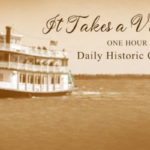By Sara Paulson [Health First]
Health First Cancer Institute Patient Celebrates End of Her Chemo by Ringing Bell, a Symbolic Goal and Gesture for Those Fighting Cancer
 Julie Osborne approached the metal bell anchored to the wall and jokingly asked if a rendition of the 1979 disco track, “Ring My Bell” was in order. With her husband, Bob, and care team eagerly grinning, she dabbed the corners of her eyes with a tissue before grasping the thickly braided ivory rope. The first yank didn’t deliver any clangs, just laughs. But on Osborne’s second try, a metal echo pierced the air, followed
Julie Osborne approached the metal bell anchored to the wall and jokingly asked if a rendition of the 1979 disco track, “Ring My Bell” was in order. With her husband, Bob, and care team eagerly grinning, she dabbed the corners of her eyes with a tissue before grasping the thickly braided ivory rope. The first yank didn’t deliver any clangs, just laughs. But on Osborne’s second try, a metal echo pierced the air, followed
by applause.
“I made it through chemo!” exclaimed Osborne, pumping her fist, minutes after finishing her final aggressive chemotherapy for Stage II breast cancer. “Good luck everybody – you will, too.”
The small bell, anchored on the wall at the second-floor nurses’ station, is easy to miss. But its symbolism isn’t. For those at the Health First Cancer Institute in Titusville – and other cancer patients completing treatment – it signifies hope and healing.
“You graduated,” Jeanette Cullen, Osborne’s shopping buddy, whispered alongside husband Bob and Osborne’s care team.
A Top Team
While a lumpectomy and other treatments still await to help prevent a recurrence of the disease, the most grueling of chemo appeared to be behind Osborne that stifling hot August day. “I can rest and relax and lay out by the pool and pretend I’m a goddess,” she said. Osborne wasn’t alone in the juxtaposition of emotions. Battling cancer isn’t a solo fight – it’s something an entire team of healthcare providers are vested in, both physically and emotionally.
 “They’re really great, great compassionate people,” said Osborne, under the care of Health First Medical Group Hematology/Medical Oncologist Dr. Asish Dalal. “Whether it be breast cancer or a brain tumor, I think you’ve really got to have a special skill set in order to handle that.” Kim Rowley, Health First Medical Group Chemo Infusion RN, said seeing her “model patient” ring the end-of-chemo bell was a must. “It’s awesome, watching them do that,” Rowley said. “It makes it worth it.”
“They’re really great, great compassionate people,” said Osborne, under the care of Health First Medical Group Hematology/Medical Oncologist Dr. Asish Dalal. “Whether it be breast cancer or a brain tumor, I think you’ve really got to have a special skill set in order to handle that.” Kim Rowley, Health First Medical Group Chemo Infusion RN, said seeing her “model patient” ring the end-of-chemo bell was a must. “It’s awesome, watching them do that,” Rowley said. “It makes it worth it.”
According to the nonprofit organization breastcancer.org, one in eight U.S. women will develop breast cancer in her lifetime. It’s the second-highest rate of cancer deaths in women, behind lung cancer. It was during a March shopping excursion Osborne discovered the thick, nickel-sized lump while trying on a blouse. The next day, she saw her doctor, who ordered a series of tests. Soon, she had a diagnosis – Stage II breast cancer. She immediately thought of her daughter. Mandi, now 41, had already lost her father and then her stepfather to cancer.
“My first thought was, ‘She is not going to have another parent die of cancer,’” Osborne said. “I told her, ‘Eventually, I’m going to die of old age or something like that. But it’s not going to be of cancer.’ ”
Showing Strength and Support
Since Osborne’s cancer is HER2-positive, aggressive therapy was prescribed. (According to breastcancer.org, this strain tends to grow faster and is more likely to spread and recur.) The four-drug chemo cocktail was tapped to shrink the tumor prior to a lumpectomy scheduled for September. “It’s an all-day process,” Osborne said of treatment, done every three weeks. Radiation and more chemo – a single drug this time – will follow for a bit as proactive measures. Her husband, Bob, 73, a retired director of engineering from the space shuttle era, has remained a constant source of support.
“There’s been so much research and stuff on breast cancer, I felt pretty confident it was something we could conquer,” said Osborne’s husband, donning a pink golf shirt. “We felt like this was something we could deal with and handle.” As for losing her hair? Osborne had no qualms. “I was really cool with it,” she said of her buzz cut. “I thought, ‘I look like GI Jane.’”
While her husband has told her that her pretty, nicely shaped head need not be covered, she’s become a fan of scarves. While the couple have remained upbeat, treatment has shifted everyday life. Riding on their Harley Davidson trike is a rarity now. “It’s pretty debilitating for about a week,” she said of chemo. “It’s like the worst flu you ever had.”
Osborne, who worked as a project manager for an outsourcing and consulting firm, retired in 2013 – the year she and her husband married. Travel became a monthly excursion – until cancer. Her husband accompanied
her the mornings of chemo; Jeanette Cullen, the afternoons. “The first day, I was a little taken aback, just seeing her hooked up” to medical equipment, Cullen said during the last session, on August 1. “But after that, we just chitchat, and it’s catch-up time. We talk about everything, and we laugh and watch TV.”
 Passionate, Compassionate and Sensitive
Passionate, Compassionate and Sensitive
Spending hours affixed to an IV, Osborne bonded with Health First Cancer Institute associates. “You talk about passionate, compassionate, sensitive people,” she said. “I can’t believe they all remember my name.” As the last bag of chemo coursed into her veins, Osborne was eager to boast about her care team.
As Health First Medical Group certified medical assistant Shanon Sprague headed over, Osborne explained, “She does my blood tests. She’s great moral support.” She quizzed Sprague, seeking advice about “graduation day” bell ringing. “I’m not really sure if I’m supposed to say something,” Osborne debated, joking, “I’m not going to go, ‘Good riddance,’ or something.” Pausing to laugh, Sprague told her: “We wouldn’t blame you if you did.”
Sprague admits she gets attached to patients like Osborne. “Just being able to help them when they’re in a rough spot is what makes me feel good as a person,” Sprague explained. As well-wishes and tears flowed, Osborne blamed the chemo. “I’m really emotional,” she said, adding a simple “good morning” can queue her to cry. So did a visit by Courtney Bisbing, who works at checkout. Julie spoke of the time she brought a woman along for support, whom she introduced as her best friend. Bisbing quickly countered, “I thought I was your best friend.” Bisbing said making a patient smile makes her day.
“I always look forward to seeing her,” an emotional Bisbing said of Osborne. “She’s always got a smile on her face, something nice to say … She’s one of those patients you’re really drawn to.” Despite an emotional goodbye and Bob Osborne telling his wife she could still come hang out with staff every few weeks – Osborne felt liberated.
“I’m grateful to have gotten through it,” Osborne said. “My feeling is anybody who can get through that kind of chemo can handle anything – absolutely anything.”











